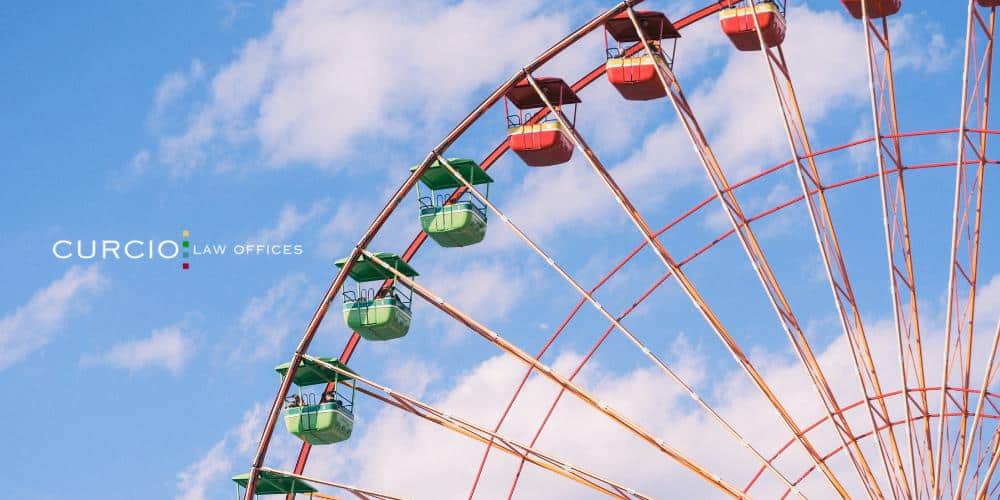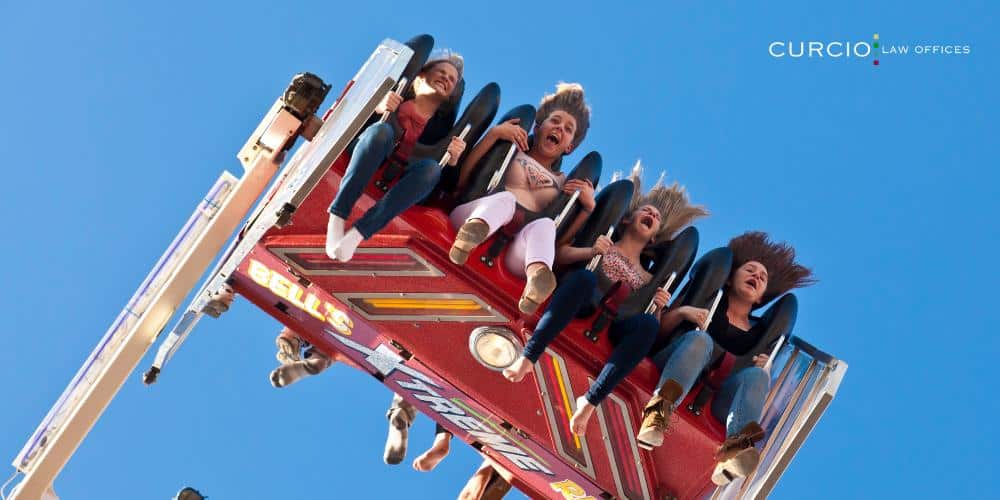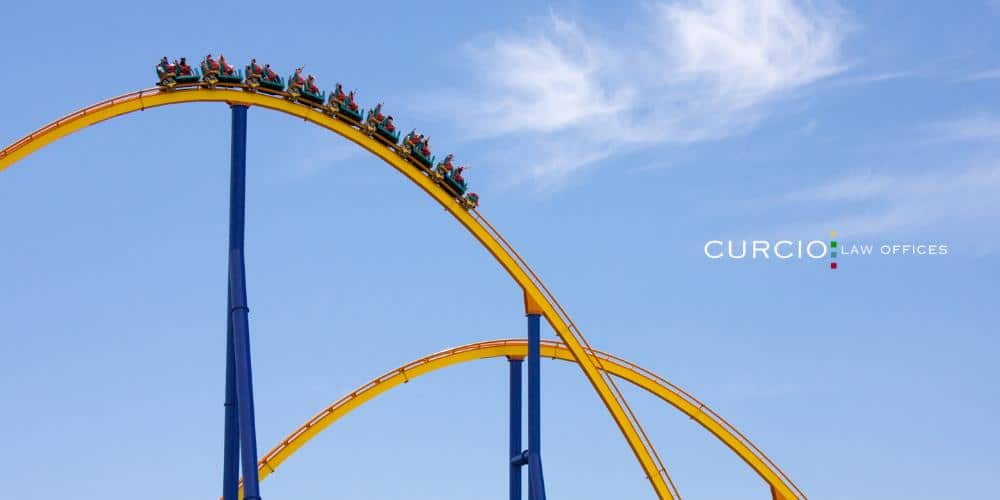CHICAGO AMUSEMENT PARK INJURY LAWYER
PRACTICE AREAS
Chicago Amusement Park Accident Lawyer
We all love spending our vacation time at amusement parks and water parks. There’s food, fun, and rides for everyone to enjoy. But people must feel safe in order to have fun. Over the last few decades, there have been thousands of amusement park injuries caused by negligence, product liability violations, and premises liability violations. Tragically, some of these injuries have resulted in wrongful death. These facts beg the question: can you sue for amusement park injuries and deaths? The answer is yes, and a Chicago amusement park accident lawyer at Curcio & Casciato can help you do so.
If you or a loved one has suffered an amusement park injury or death, you have grounds to speak with our top-notch Chicago personal injury law firm. We believe that a negligent ride operator, manufacturer, or owner deserves to be held responsible for causing harm to patrons. Call 312-321-1111 to schedule a free consultation with our legal team today.

How Common Are Amusement Park Accidents in the U.S.?
Major amusement park accidents that cause injury and/or death may sound like a rare occurrence, but they happen more often than you think. Between the years of 1987 and 2000, there were 51 deaths caused by amusement park rides according to data from the U.S. Consumer Product Safety Commission (CPSC).
Between the years of 1993 and 2000, there were a total of 65,689 amusement ride injuries that were treated in ERs according to data from the CPSC. The most commonly injured body parts between these same years were the neck, head, chest, and abdomen. In fact, these 4 body parts accounted for nearly 50% of ER visits following amusement park accidents.
More recently, the CPSC stated that nearly 31,000 amusement park injuries warranted ER visits in 2016 alone.
Which U.S. Amusement Park is the Most Deadly?
Action Park in Vernon Township, New Jersey, was known as the most deadly amusement park in the United States. The theme park was largely known for its poorly designed waterpark rides, its intoxicated staff and guests, and its poor safety record. In fact, it was nicknamed “Class Action Park,” and for good reason.
At least 6 people died at Action Park between the years of 1982 and its closing year – 1996. Hundreds more park visitors suffered injuries that warranted hospital visits. Many local health care workers at the time stated that they treated anywhere from 5 to 10 park patrons on the park’s busiest days. Action Park even bought extra ambulances for the township to keep up with the number of injuries.
The amount of personal injury lawsuits filed against the park caused many rides to shut down over the course of several years. Eventually though, the entire park closed in 1996 due to mounting financial woes.
Amusement Park Injuries and Deaths at Six Flags Hurricane Harbor in Chicago
Hurricane Harbor Chicago has had its fair share of accidents over the last several years. Below, we discuss one of the most notable incidents.
Shatoya Meeks filed a personal injury lawsuit due to a major hand injury she suffered on the Wahoo Racer slide in July 2011. She filed the lawsuit 6 years later, in 2017. Meeks suffered deep lacerations and torn ligaments in her wrist and hand that required surgery. Even several years after the incident, Meeks struggled to move 3 fingers on the injured hand, which made it difficult for her to do her data entry job, brush her teeth, and cook for her children. She also claimed to have constant throbbing pain and post-traumatic stress about the incident.
Meeks’ amusement park injury attorney claimed that park operators failed to warn patrons about the slide’s dangers, failed to properly inspect the slide for jagged edges, and failed to operate the slide properly. A court upheld a $1.5 million judgment for her waterslide injury.
Common Types of Amusement Park Accidents and Injuries
Because of the amount of roller coasters, waterpark slides, and other amusement rides that theme parks have, a lot can go wrong. Common types of amusement park accidents include:
- Deadly falls from tall rides or slides.
- Mechanical issues such as broken cables, brake failures, cars that get stuck on the tracks, etc.
- Poorly trained ride operators who may fail to check safety harnesses and seat belts, fail to deploy safety nets, and fail to stop the cars correctly.
- Drownings on water rides, slides, and pools.
- Roller coaster ejections due to poor, unchecked, or malfunctioning safety harnesses.
- Accidents caused by poor ride design.
- Collisions between amusement ride cars, structures, and riders.
- Slip and fall accidents due to slippery or broken stairs, ramps, and platforms.
- Accidents caused by park patron errors, such as failing to follow safety instructions and failing to heed health warnings on each ride.
Common amusement park injuries include whiplash, traumatic brain injuries, spinal cord injuries, strokes from spinal injuries and head injuries, broken bones, muscle sprains and strains, degloving injuries, internal organ damage, lacerations, bruising, drowning injuries, fall injuries, and so much more.

Can You Sue an Amusement Park for an Injury?
Yes, you can definitely sue for an amusement park injury, especially if you suffered a variety of damages such as medical expenses, lost wages, pain and suffering, and more. If a loved one died due to an amusement park ride, you may have grounds to file a wrongful death lawsuit on their behalf. The Chicago wrongful death lawyers at Curcio & Casciato can handle both personal injury claims and wrongful death claims.
You may be wondering: who do you sue for for an amusement park injury? Possible responsible parties can include amusement park owners, ride manufacturers, and ride operators. A Chicago amusement park accident lawyer at Curcio & Casciato can examine the details of your case and help you determine who the negligent party is.
Another question you may have is: what exactly do I sue for? The answer depends on exactly what caused your injury. For example, an amusement park injury could have been caused by negligence, product liability violations, and premises liability violations.
Suing for Negligence in Chicago
Negligence is a legal term that describes someone’s failure to take reasonable care which results in injury or death. You can hold an amusement park liable for negligence by proving the 4 D’s of negligence:
- Duty of Care: The amusement park owner, manufacturer, and/or operator owes all park patrons a specific duty of care. In other words, all of these parties have a responsibility to keep park patrons safe.
- Duty Dereliction: The owner, manufacturer, and/or operator breached this duty of care through negligent actions or inactions.
- Direct Cause: The negligent actions or inactions directly caused injury or death to a park patron.
- Damages: The park patron suffered a variety of damages due to their injury or death for which they should receive financial recovery.
Examples of negligent actions/inactions that could result in injury or death include failure to perform ride inspections, failure to provide adequate training to ride operators, failure to operate a ride correctly, failure to inform riders of safety rules, failure to check safety harnesses, and failure to warn rides about health risks.
Suing for Product Liability in Chicago
You could also sue for product liability violations. This means that you were injured due to a defective ride or a lack of warning about health risks.
An amusement park ride can be defective due to manufacturing or design or both. These defects can lead to serious injuries and/or death of park patrons. Also, some people with chronic health issues should not get on certain rides or attractions because it could make their health issues worse. So amusement parks must include warnings on all rides that could threaten pre-existing health conditions. Failure to do this could cause someone with a pre-existing heart condition, for example, to suffer a heart attack on a ride.
Suing for Premises Liability in Chicago
Lastly, a Chicago amusement park injury lawyer could help you sue for premises liability violations. For example, suffering a slip and fall injury due to poor maintenance of stairs or ramps is a premises liability issue. Poor maintenance of roller coasters, slides, and other attractions can also be a premises liability issue.

Amusement Park Damages
A Chicago amusement park accident lawyer at Curcio & Casciato can help you recover compensation for the following types of damages:
- Past and future medical bills
- Past and future physical therapy bills
- Lost wages
- Loss of earning capacity if the injury prevents you from completing your normal job duties
- Emotional distress
- Physical pain and suffering
- Mental health counseling bills
- Permanent scarring, disfigurement, and/or disability
- Loss of consortium
- Loss of enjoyment of life
- Funeral and burial expenses if the accident resulted in wrongful death
Are Amusement Parks Regulated?
Yes, both amusement parks and traveling parks are regulated. Amusement parks that are in a fixed location (such as Walt Disney World and Six Flags) are generally regulated by state and local agencies, while traveling parks and carnivals are regulated by a federal oversight agency called the U.S. Consumer Product Safety Commission (CPSC). All of these agencies are responsible for ensuring that the theme parks follow a strict set of safety standards in order to prevent accidents, injuries, and deaths.
Illinois Laws Regarding The Safety of Amusement Park Rides
Illinois is one of many states that recognizes and prioritizes amusement park safety. According to the Illinois Amusement Ride and Attraction Safety Act, all amusement rides and attractions must be inspected before a ride is open to the public and must be inspected after its opening on an annual basis. Once a ride has been inspected and approved, it will have a visible permit stuck to it which expires the next year.
Illinois amusement park owners who fail to follow the aforementioned inspection law can face a misdemeanor charge on their record and a hefty fine.
How You Can Protect Yourself at Amusement Parks
Because amusement park manufacturers, owners, and operators aren’t perfect (despite all the laws and regulations in place), it’s crucial to do what you can to protect yourself at a theme park. Accidents also happen when patrons act recklessly or carelessly. Be sure to:
- Follow all the instructions on a ride or attraction
- Make sure every single ride has a permit sticker from the Illinois Department of Labor (IDOL) before riding
- Make sure to use all necessary safety equipment on a ride or attraction
- Keep your arms and legs inside a moving ride, such as a roller coaster
- Stay in your seat until an operator tells you it’s safe to get up
- Make sure your children are aware of safety rules on each attraction
- If you notice a safety hazard or you notice a ride without a current IDOL permit, be sure to report it to the local police and/or to IDOL at 217-782-9347



